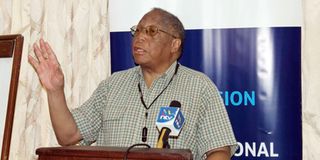Remembering Joe Kadhi: a paradigm of professionalism and standard-bearer

Veteran journalist Joe Kadhi during a Media Council of Kenya forum on media’s role in fighting religious radicalisation in Mombasa in 2014.
What you need to know:
- It's no wonder, then, that, following his death on Wednesday last week, many of those who remembered Joe Kadhi most fondly and reverently were top editors and editorial heads he either helped train or mentored.
- He went into full-time media training, beginning in the early 1990s, consequently helping mould and build the careers and vocational forté of some of the scribes and editors Kenyans know and perhaps admire today.
- Upon his demise last week, President Uhuru Kenyatta, in his laudatory elegy, remembered and extolled his role in preparing journalists for the media coverage of the epoch-making 2017 General Election.
Growing up in the not-too-long-ago-designated Rift Valley city of Nakuru in the late 1980s and early '90s, I remember watching my late father, until his death a Kenya Railways labourer who owned and ran a pokey shoebox of a hotel furnished with tables strewn with tea-stained newspapers, ardently reading the late Joe Kadhi's weekly column titled 'Why? Asks Joe Kadhi,' in the Sunday Nation newspaper.
In the particular edition, the editorial page, leading with the veteran journalist's column and photo, was my late father's favourite and the reason his otherwise esteemed customers read an English language newspaper once a week for a change.
Interestingly, Joe had been writing the column for close to two decades already by the time of my birth on February 2, 1987.
And my father, born in the early '60s, had been reared on it. In the column, according to my father, Joe characteristically tackled issues that were "vitally important" to the intellectual consciousness of any young man minded to have and play an active role in the building of an equally young nation.
Joe Kadhi also served, for close to a decade, as managing editor of the Daily Nation newspaper until the early 1990s, the time during which, together with others, he mounted the advocacy of press freedom and shed on his juniors (and fellow journalists) the predilection for journalistic ethics.
Notable scribes, some of who went on to become acclaimed editors, were his understudies.
Checkered career
Before joining the Nation Newspapers Limited (as the Nation Media Group - NMG - was known then) in 1968, he'd worked with several publications associated with the country's agitation for Independence such as Sauti ya Kanu, Mfanyi Kazi and Sauti ya Mwafrika, and later for the East African Standard, Kenya's oldest newspaper, founded in 1902.
And, together with other prominent editorial figures such as George Githii, Peter Mwaura, George Mbugguss, Philip Ochieng', Ali Hafidh and Hillary Ng'weno, he aided in the steering of the editorial policy and evolution of the Kenyan media.
It's no wonder, then, that, following his death on Wednesday last week, many of those who remembered him most fondly and reverently were top editors and editorial heads he either helped train or mentored.
He went into full-time media training, beginning in the early 1990s, consequently helping mould and build the careers and vocational forté of some of the scribes and editors Kenyans know and perhaps admire today.
And later he taught trainee journalists at the University of Nairobi's School of Journalism (SOJ), Addis Ababa University and the United States International University - Africa (USIU - Africa).
Eulogised
Upon his demise last week, President Uhuru Kenyatta, in his laudatory elegy, remembered and extolled his role in preparing journalists for the media coverage of the epoch-making 2017 General Election, which saw, for the first time in the history of Africa, a sitting president's election victory nullified by a court of law, and palpably pushed the country to the edge of a precipice.
A member of the Bajuni community of coastal Kenya, though bred in the sprawling Muslim neighbourhood of Majengo, in Nairobi, the late Joe, not only had a good grasp of the Kiswahili language but also was a leading member of the pantheon of Kenya's finest writers in English, who, in 2015, was honoured with the Lifetime Achievement Award during that year's Media Council's Annual Journalism Excellence Awards ceremony in Nairobi.
Several decades earlier, he'd worked closely with trade unionist and politician Tom Mboya (1930-1969) to both coordinate and leverage the activities and role of then pro-Independence media publications as well as see to the protection and augmentation of journalists' welfare.
Joe, who obtained a diploma in journalism from the University of Nairobi in 1971, before his appointment to the position of managing editor of the Daily Nation in 1979, later moving to the Sunday Nation in a similar capacity and subsequently serving as assistant group managing editor between 1988 and 1991 under George Mbugguss, then Group Managing Editor of the Nation, is, for many a contemporary scribe, a paradigm of journalistic conduct and éclat. And professional propriety.
As we head to yet another major election, his professional life will and should goad reporters, editors and columnists into recognising the need for, embracing, promoting and maintaining, not only journalistic neutrality, objectivity and impartiality, but also editorial iconoclasm and chutzpah.
Such was the occupational lodestar that drove the late Joe Kadhi and his peers, and whose transference to media and journalistic canon we must all aspire and strive to actualise.
Mr Baraza is a votary of global peace, historian, writer, thinker and founder Public Affairs Volunteers for Global Peace and Climate Justice (PAVGPCJ). [email protected]





